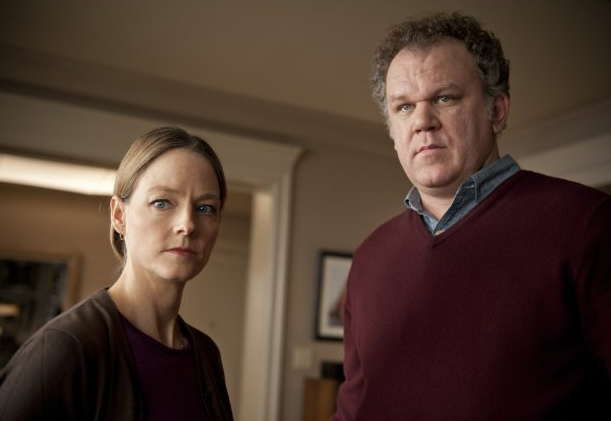Roman Polanski’s Carnage
Roman Polanski’s latest effort is an adaptation of French dramatic auteur—and, for a short while, Nicolas Sarkozy confidante–Yasmine Reza’s play “God of Carnage.” After being favorably received onstage, both Broadway and the West End mounted productions to mostly positive acclaim. It seems natural, then, that a film version—a ninety-minute set piece in which the characters barely leave the room—would attract a cast interested in flexing their stage-acting muscles, and that’s exactly what Polanski’s stars do.
Not only do we have Jodie Foster and Kate Winslet facing off as dueling mothers, Christoph Waltz plays an insufferable lawyer (husband to Winslet’s character), and John C. Reilly holds his own as Foster’s husband. There are three Oscars and god knows how many nominations between them but “Carnage” still feels very much like a stage play, having inherited both the pleasures and restrictions inherent to it. Where is the cinematic space in all this? And yet, the resulting film is funny, engrossing, and maybe a bit disturbing—it makes you wonder what your neighbors really think of you (Neil Labute must not have been very far when Polanski & Co. sweated over the script).
A playground duel between the two couples’ sons (shown to us briefly under the opening titles, from afar) sets things in motion. One child has bashed the other in the mouth with a stick—so far so good—and the parents all agree to meet to work out an amicable solution. For the rest of the film’s runtime we scarcely leave the well-appointed living room of Foster and Reilly’s characters.

Soon they’re colliding on their differing philosophies on everything from childrearing to politics. Waltz and Winslet are rich, stressed-out professionals: Waltz is constantly interrupted by his blackberry and Winslet paints a portrait of skillful politeness and inner distain of the upper class perfectly.
Foster and Reilly are supposed to represent a less-intense, slightly hippier demographic—the Park Slope to Waltz and Winslet’s Gramercy Park. However, these class distinctions aren’t as sharp as Polanski and his production designer seem to think they are; Foster and Reilly’s apartment is nothing short of palatial (have you house-hunted in Brooklyn lately?) and Foster’s character must be independently wealthy, since she works as a part-time writer while her husband is a traveling salesman.
Polanski rather lampoons, more than anything, the “conspicuous authenticity” of people like Foster’s character. Though Waltz’s character is a soulless shark and Winslet’s a stuck-up bitch, somehow the film doesn’t condemn them as directly as it does the hypocritical do-gooderism of Foster’s character.
As their meeting devolves from conversation to debate to all-out argument, the four characters form and break alliances; sometimes the women gang up on the men, sometimes it’s one couple against the other, and everyone comes off badly (though it makes for great comedy). It’s almost titillating to watch Reilly’s character revealing his true, un-PC—and very un-Brooklyn—opinions in crude terms, and to see Winslet’s character drink too much and sound off on her sleazy husband. You’re secretly urging the characters to really speak their minds, because the pleasure of the film comes from delighting in their barely-concealed prejudices. If only we could all say what we really think, the film seems to say, perhaps a life would be a whole lot simpler. Or just different.
Currently showing at the 49th New York Film Festival. Opens December 16th in New York and Los Angeles.
[jwplayer config=”Default-Post-Player” mediaid=”6822″]news via inbox
Nulla turp dis cursus. Integer liberos euismod pretium faucibua


